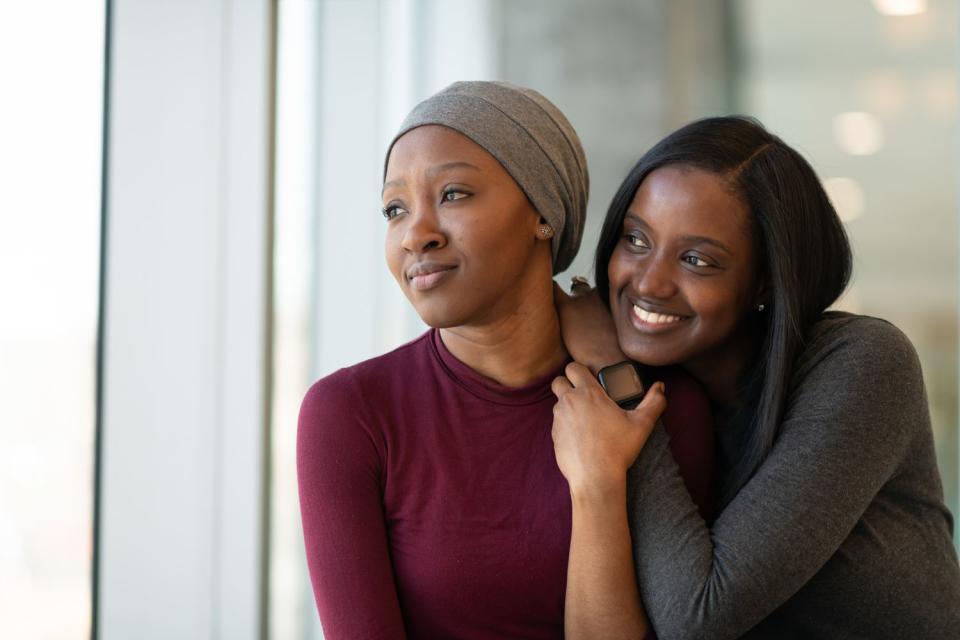5 Breast Cancer Survivors Share the Biggest Lessons They Learned from Battling Cancer
The statistics are eye opening: About one in eight women will develop breast cancer in her lifetime. Whether you've recently been diagnosed with breast cancer or know someone who has, it can be comforting to feel connected and supported during the journey. We spoke with five breast cancer survivors who walked us through their greatest challenges, the lessons they'd like to share with other women battling breast cancer, what helped them get through treatment, and the biggest changes they've made since being diagnosed.

Getty Images
Lesson 1: You Have to Take Care of Yourself Before You Can Care for Others
When I was first diagnosed, the biggest challenge was figuring out how to get the best care while caring for my ill husband. When my doctor at Mount Sinai Dubin Breast Center told me I was a candidate for brachytherapy, I was thrilled. Instead of going to the hospital five days a week for six weeks, my doctor inserted radioactive material during one of my surgeries. Forty-five minutes later I was done with radiation treatment.
My advice for women? Regular mammograms save lives. My sister and I always went for ours together, but I had so much going on the year I was diagnosed that I said I’d reschedule. She insisted I go; thanks to her, my cancer was caught early. - Kathleen D., 63, diagnosed two years ago with stage 1
Related: Real-Talk Answers to Your Most Asked Breast Cancer Screening Questions
Lesson 2: Your Family History of Cancer on Your Dad's Side Matters Too
Deciding where to get treated was the biggest challenge when I was first diagnosed. I was living in a small town in Idaho and didn’t feel comfortable being treated there. A former coworker told me about Cancer Treatment Centers of America, and I decided to go to their Zion, IL, location to get a second opinion. For a while I had to get on a plane every three weeks to get treated.
I want every woman to know that you should know your entire family health history; it impacts when and how often you get screened for diseases like breast cancer. Two of my aunts, five great-aunts, and my great-grandmother (on my dad’s side) all had breast cancer. - Jo A., 45, diagnosed five years ago with stage 3
Lesson 3: It's OK to Ask for Help
When I was first diagnosed, the biggest challenge was accepting help. While I was getting treated, I lost my job and ran through my savings. I found out about the AiRS Foundation, which gives financial aid to women who can’t afford reconstruction; they paid for my surgeries.
Being honest with others and myself helped me through treatment. Initially, I downplayed the situation because I wanted to seem strong. Once I embraced the fact that it was going to be a tough year or two, I stopped beating myself up when I couldn’t be the mom I used to be. Some days I had to stay in bed all day and ask other parents to pick up my kids from school, and that was OK.
The biggest change I've made since battling breast cancer is building a smaller but stronger network of friends. At first, I was depressed about good friends who seemed to disappear, and my grandmother said, “You’re so focused on everyone who isn’t there for you that you’re not able to appreciate those who are.” Once I shifted my mindset, I strengthened my relationships with those who did want to go on this journey with me. - Asia C., 34, diagnosed two years ago with stage 3
Lesson 4: Speaking Up Can Be Empowering
Juggling treatment, graduating from college, and starting a new job made navigating life following my breast cancer diagnosis even more difficult. I’m a big believer in telling people what’s going on, so I reached out to human resources and the managers at my job and ended up deferring my start date.
The best breast cancer advice I got came from my mom; she always told me to do self-exams, and I ended up finding the lump. My oncologist also suggested freezing my eggs. I didn’t realize chemotherapy might impact my fertility.
A cancer diagnosis can feel isolating but know that you’re not alone. I went out of my way to be friends with women in breast cancer groups—Gilda’s Club Chicago, Imerman Angels, The Breasties, and Susan G. Komen. I also connected with a group of young women being treated at the same hospital as I was. - Anna W., 26, diagnosed one year ago with stage 2
Lesson 5: A Regular Schedule Is a Powerful Coping Tool
When I was first diagnosed, the biggest challenge was telling my children. My daughter was 20 and at college; we decided it would be less dramatic to tell her over the phone. My son was 17 and my youngest daughter was 8, so we got appropriate books for her about a parent going through cancer treatment.
Sticking to my work schedule as much as possible helped me through treatment. I took time off after surgery, but I kept working during chemotherapy.
I want every woman to know that it helps to connect with people who have something you consider important in common, whether that is having the same type of breast cancer or being around your age. I’m a volunteer for Living Beyond Breast Cancer, which matches women going through the disease. - Karen S., 63, diagnosed 13 years ago with stage 3

